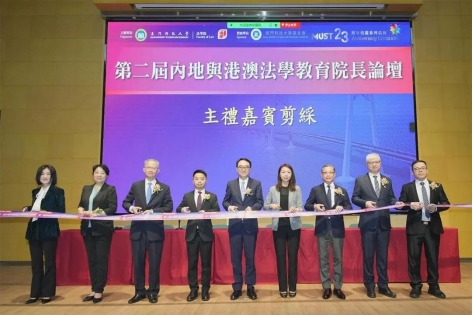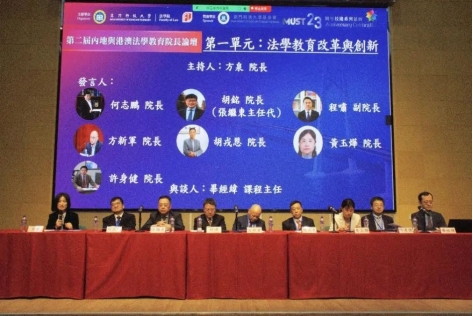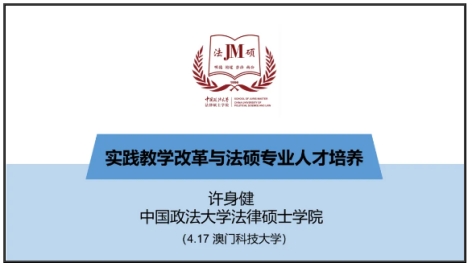On April 17, 2023, Dean XU Shenjian was invited to attend the “Second Mainland-Hong Kong-Macao Law School Deans Forum” held by the Faculty of Law at the University of Science and Technology of Macau. The forum was hosted by the Faculty of Law, University of Science and Technology of Macau and supported by the Macau University of Science and Technology Foundation. Twenty deans from Chinese mainland, Hong Kong, Macau and German law schools gathered at the University of Science and Technology of Macau to discuss innovation and reform in legal education.

The opening ceremony was jointly presided over by LI Xuefei, Minister of The Education and Youth Development Bureau of the Liaison Office of the Central People’s Government in the Macao S.A.R., DING Shaoxiong, Acting Director of the Education and Youth Development Bureau in the Macao S.A.R., LIANG Yingyan, Acting Director of the Macao SAR Legal Affairs Bureau, HUANG Xianhui, Chairman of the Macau Lawyers Association, MO Qiming, President of the Macau Higher Education Development Promotion Association, JIA Liqun, General Manager of China Legal Services (Macau) LTD., Lawyer LI Huanjiang, a member of the NPC Macao Special Administrative Region Basic Law Committee, PANG Chuan, Vice President of the University of Science and Technology of Macau, and FANG Quan, Dean of the Faculty of Law at the University of Science and Technology of Macau.

Ribbon-cutting Ceremony by Officiating Guests
(From left to right: FANG Quan, JIA Liqun, HUANG Xianhui, DING Shaoxiong, LI Xuefei, LI Yingyan, MO Qiming, PANG Chuan, LI Huanjiang)

Group Photo of Officiating Guests and Deans

The forum consisted of three sessions. Dean FANG Quan of the Faculty of Law at the University of Science and Technology of Macau chaired the first session themed “Legal Education Reform and Innovation”. In this session, XU Shenjian, Dean of the School of Juris Master in CUPL, shared his insights into the legal practice, education reform and the cultivation of legal masters. Prof. BI Jingwei, Director of Curriculum at the Faculty of Law, University of Science and Technology of Macau, also participated in the discussion.

Dean XU Shenjian first shared the current status, challenges and opportunities in the cultivation of legal masters. He stated that there are mainly four problems in the cultivation of legal talents. Firstly, the reform in the concepts of legal talents cultivation, curriculum, practical teaching and innovative mechanisms has not fully adapted to the requirements of legal talents cultivation in the new era. Secondly, the objectives and curriculum content for undergraduate students and master students in law major have not been clearly defined. Thirdly, the high-level legal professional education system has not been well established. Fourthly, inadequacy still exists in the cultivation of legal professional skills and ethical training. Prof. XU Shenjian pointed out that, in the construction of the rule of law and with the socio-economic development, outstanding legal talents should be proficient in bilingual legal practice, possess an international perspective, have a good understanding of international rules, be able of participating in international legal affairs, safeguard national interests, promote reform in global governance rules, and serve the Belt and Road Initiative (BRI) by getting familiar with the legal systems of countries along the BRI. In response to these issues and demands, Prof. XU Shenjian believed that it is necessary to seize the opportunity for the development of professional degree education and deepen the reform in legal professional degree education. Based on the training objectives of the Juris Master (Non-jurisprudence) program at CUPL, he pointed out the focuses and difficulties in the training of master students of Law (Non-jurisprudence). He emphasized that we should fulfil the fundamental task of combining moral education with law training so as to cultivate legal talents with both integrity and professional competence. It is also necessary to establish teaching goals of knowledge imparting, ability training and values shaping, with a focus on fostering strong legal ethics, as well as laying a solid foundation for legal knowledge and literacy. On the basis of a compound knowledge structure, this will help integrate the undergraduate professional background with legal knowledge and legal professional skills. Furthermore, Prof. XU Shenjian provided further explanations on the concept, content and implementation of practical teaching. He mentioned that practical teaching consists of theoretical courses, legal professional skills (simulation) courses, and legal clinic courses. The reform in practical legal education (Non-jurisprudence) can be achieved by strengthening practical teaching and training, making legal clinics a compulsory course for full-time master students of the law, adopting a dual-teacher classroom and dual-supervisor system, enhancing the construction of the faculty for practical teaching, and promoting the integration between industry and education. When it came to the issue of safeguarding and supporting practical legal education (Non-jurisprudence), he believed that four systems should be in place for the implementation, namely, institutional guarantees, brand activities, industry-education integration and case development. Finally, Prof. XU pointed out that the School of Juris Master will further improve and implement the integrated cultivation model for master students of the law, continue to promote and optimize the dual-supervisor training mechanism, utilize the opportunity provided by the foreign-related lawyers cultivation program, deepen the reform in the industry-education integration and the order-based cultivation model for professional degree master students, and study and explore the implementation of the professional degree education for doctoral students of the law.

In the closing remarks, Dean FANG Quan of the Faculty of Law at the University of Science and Technology of Macau expressed gratitude to the deans from Chinese mainland, Hong Kong, Macau, and Germany for their trust and support. This forum marked the first large-scale offline academic event hosted by the Faculty of Law at the University of Science and Technology of Macau since the pandemic. It is hoped that this event will strengthen connections, deepen friendships, and foster collaborative development among law schools across various regions.